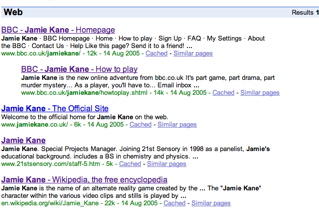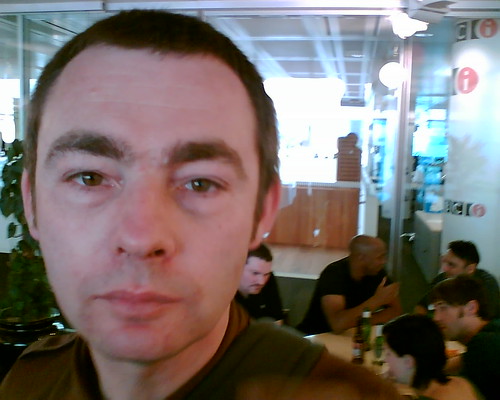Wednesday, August 31, 2005
Monday, August 29, 2005
Mark Thompson and an Open BBC
I can't find the full text of the speech anywhere but The Guardian has published extensive quotes. Most of the publicity from Edinburgh coming from Thompson and (Jana Bennett) has focused on the announcements that the BBC is going to launch trials to internet stream BBC ONE or TWO in the new year, launch a 7 day TV catch up service (similar to the Radio service) and the launch encompassing all of this of a MyBBCPlayer which will also feature a growing amount of BBC TV and video archive.
However buried in Thompson's speech was this ringing (ok, a few caveats) endorsement of openness and the concept of many to many and a very a rare example of a TV executive using the phrase "network effect".
"I also believe that these digital rights solutions will exist in a world which is increasingly open and interoperable and we are working with partners like Microsoft and Kontiki to find them. The first stage of digital was notable not just for the world wide web but for its many successful walled gardens and pieces of proprietary hardware - from the first Sky digibox to the iPod. I'm sure some proprietary products and services will continue to flourish in this second stage - we're partners both with Sky in satellite TV and with providers of linear services on both cable and ADSL. But the biggest momentum at present seems to be behind open solutions where choice is wider, where the consumer is fully in control and where awesome network effects can get to work"
UPDATE: The full text of the speech is here: Mark Thompson, BBC Press Office | Speech given at the Edinburgh International Television Festival 2005
Tuesday, August 16, 2005
In the top 312
The blogosphere loves a bloomin' list. And here's Feedsters' Top 500 blogs. The lovely Backstage (We're not even sure if it actually is a blog although its built using MT) is currently er, No.312. Engadget is No.1.
Jamie Kane and Wikipedia
Well I was going to blog this yesterday but in my lethargy Andrew, Martin and Ben have already chipped in. In fact even the (paper) Guardian has written a story on it that turned up in G2 this morning. They, of course, neglected to mention that Rob Cooper from the Jamie Kane team has now clarified that there was no intention by the BBC to game Wikipedia and help promote the project. As if it now matters...
All I can really add is that the current (it might still be deleted) Jamie Kane Wikipedia entry has evolved into a comprehensive overview of the game, the BBC's motives for developing it, and an accurate insight into what has after all been a (very) minor kerfuffle.
All in the space of 48 hours. The lengthy debate on the vote for deletion page has nearly 100 comments now mostly arguing for the article to be kept and it shows as Martin points out, how these internet tools can be used swiftly as a platform for the BBC to respond when its decisions and actions are held up to scrutiny. And it looks as if following the blog posts above and the commenting on Boing Boing and Wikipedia itself and emails to those writing about the story that this is a model of the BBC attempting to be accountable to its audience. But Hutton this is not.
As it turns out the "official" game site is still the top entry in Google.

But look who's rising fast.
And who's this? Did we invent her too ?
Monday, August 15, 2005
Citizen Prommers
Anthony Holden, the music critic of The Observer wrote a piece yesterday ("Log On, Lash Out", 14.8.05) for the Review section entirely made up of quotes from users of the message board on the BBC Proms website.
In it he admits that the board's users are "discriminating", "lively" and its full of "welcome wit". Who'd have thought it ? He concludes the piece by admitting that contributor; "I loathe Lucy" has come up with a better reason than he could for "schlepping" down to the Albert Hall instead of listening at home with a "glass of claret".
The sound quality (on Freeview), he or she complains, was 'dreadful', with poor orchestral balance, insufficient reverberation, low dynamic range and too much distortion.'The whole effect was like listening to a bad mono recording from the 50s,' said I Loathe Lucy. 'Hardly progress to the 21st century.
Surprisingly there's currently no reaction, as yet, to Holden on the board although there is plenty of that welcome wit on offer especially the thread (initiated by Tim Durham) about the absence this year of proms phenemenons I was unaware of; shouting and rhythmic stamping; "Where Have All the Good Shouts Gone?"
My favourite shout at the Proms was at the Last Night last year, when The Liberty Bell by Sousa was about to be played, it was simply:
"It's!"
UPDATE: Martin also picked up on this and picked out some better quotes;)
Wednesday, August 03, 2005
Yahoo: Head of Social Media
Paid Content (via Simon Waldman) reports that Yahoo have hired Elisabeth Osder as Senior Director, Social Media in their media group. Yahoo Media VP; Scott Moore argues that this area is will be one of their 3 top priorities this year (along with user experience and broadband.) The PC report quotes Moore and goes on...
"(this is) a clear indicator of our intention to go deep in social media and user-generated content." Her initial task will be to set up a plan that integrates Yahoo's growing phalanx of social media tools -- Yahoo 360, Flickr, etc. -- with an emphasis on interesting user-generated content. "Figuring out how to harness the power of that self-expression and user-generated content, not only the willingness and desire to share, is the essence of what is Elizabeth is going to do for us," says Moore. Part of her job is to figure out what kind of resources will be needed. Adds Moore, "This is a real initiative and a real focus for us. We'll do what it takes."
Jeremy Zawodny, from the Yahoo Search group came to visit us at the end of July and this appointment confirms many of the themes and memes from his presentations both to the BBC and to Open Tech that weekend ( including his non denial denial that Y! were developing a blog search.) James Boardwell has encapsulated it perfectly in his post; Yahoo: more like human activity and less like software. where he describes the data centric world that Zawodny hinted at but argues that trust will be the issue to solve (and identifiers! *pdf) once these types of models are established.
the main issue will then be around trust. Who do you trust to provide this information? How do you 'know' the data is itself trustworthy? You don't. You have to go with the filter you use - and the 'brand values' of 'trust'. Who do you trust? Yahoo!? Google? the BBC? And to what extent?This is a conversation that i feel like i've had many times over. And will have again.
Tuesday, August 02, 2005
Beethoven vs Backstage
Thanks to what looks like the name of a Kelloggs blog; the fantastic Tech Crunch "Dedicated to obsessively profiling and reviewing every newly launched web 2.0 business, product and service." no less I've just been trying out IceRocket (where do they get these names?) which is a v.fine new blog search/trend tool. What impresses the most are the graph tools that plot the popularity of various memes/products/posts knocking about the blogosphere.
Here's Backstage versus the BBC's Beethoven Downloads

Monday, August 01, 2005
Backstage T Shirt
When Backstage was announced, Ben Hammersley was so effusive about the project that he could barely contain himself. In tribute to this post and because Backstage needs some competition prizes I've knocked up a team t shirt to give away. (or rather the app on Cafe Press did). Ben M mentioned this in his presentation at Open Tech last saturday. (1 minute in).

Unfortunately I couldn't find the BBC Model B font so i used a commodore 64 one instead. Ben M says it should be black.


